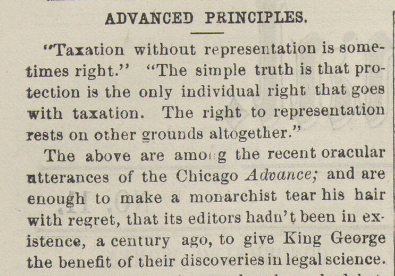“If women be voted for, what shall longer hinder them from voting?”
Lavinia Goodell, March 1874
Lavinia Goodell was an avid reader and did not shy away from reading materials with which she disagreed. When that occurred, she would sometimes write a rebuttal piece in order to share her opposing viewpoint with the publication’s readers. She did this in March of 1874, three months before being admitted to practice law. Her target was an article in the Advance, a weekly publication of the Congregational Church, that proclaimed, “Taxation without representation is sometimes right.” In an article published in the Woman’s Journal, Lavinia said this notion was “enough to make a monarchist tear his hair with regret.”

Lavinia then turned the discussion, as she often did, to the right to vote. She noted that in the Middle Ages, “those paying taxes on property had the right of voting for members of Parliament,” which was the body that gave or withheld funds. so it became a principle of English common law “that those protected owed allegiance, and that those taxed should be represented.”
But what of women’s right to be represented? Lavinia pointed out that the Advance had come out in favor of women serving on school boards. She said:
It was once a powerful argument against Woman Suffrage, that if women voted they would have to be voted for — to hold office — and then the heavens would certainly fall! Pictures of coarse, unsexed, masculine women, meek and suffering husbands, and neglected children were sketched ad infinitum, till we all closed our eyes and shuddered in holy horror. And now here comes the Advance and begs that women be put on our School boards!
If women be voted for, what shall long hinder them from voting? If Mrs. Smith has time to serve on the School Board, it were sad indeed if Mrs. Jones had not time to step around to the next corner and drop a ballot for her.
The opponents of Woman’s Rights have been obliged to draw some exceedingly fine lines in their day, but the Advance deserves the premium for drawing the line so close as to put women officeholders among the sheep, and women voters among the goats.
Read the entire piece here.
Sources consulted: Woman’s Journal, vol. 5, No. 11, 3/14/74, seq. 88, Schlesinger Library, Radcliffe Institute, Harvard University.







